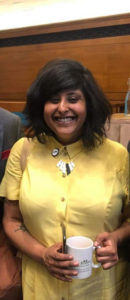Gay activist Saima Razzaq gives her opinion of the Birmingham schools protest controversy.
Over the last six months two inner-city Birmingham schools have seen a spate of disruption outside school gates from a Muslim majority of men – men who represent both sides of the argument.
Whilst some Muslim men have formed picket lines outside schools, to only then be challenged by other men, we must remember that it’s Muslim women that are leading the conversation for reform and much needed change in our communities.

Every time I pick up my phone or switch on my laptop I am presented with another man taking the stage in a way of representing me and my community and I ask myself how does this man; heterosexual or LGBTQI, represent the female experience or the injustices of gender inequalities?
In this debate our voices are simply being lost and we must not forget that historically it’s Muslim women who have championed equality in our communities and that also includes LGBTQI equality. Muslim feminists Amina Wadud, Tamsila Tuaqir and Yasmin Alibhai Brown have all publicly championed for all equality, including LGBTQI.’
Women need to and should be at the forefront of the conversation on gender and sexuality in a Islamic context – our bodies and our sexuality needs to be defined by our voices. People who are often fighting for reform and a progressive Islam are Muslim women.
We as Muslim women need to find a way to detach ourselves from this continuous male choke hold of a narrative that sees men representing the British Muslim experience, when in fact they represent no one but themselves.
I am the product of a child bride, and it’s only now in my thirties that I have felt confident enough to speak up on the injustices my mother has faced. That’s not to say my father was to blame – he himself was a victim of circumstance and so called positive migration.
Coming to terms with the injustices my parents faced has only fuelled me to challenge the patriarchal rule within society and my community. I myself am just a girl from Small Heath and am proud to say I am also a businesswoman in my own right, and have been very fortunate with the opportunities I’ve had in my working life.
There was never a magic pot of gold in our family and we’ve all worked very hard to create our own privileges. But at the same time I’m not prepared to stand by and watch the demonisation of the communities who showered me with an abundance of love during my childhood and continue to do so to this day.
I think all parents will agree that we need to raise and nurture future leaders who will stand tall in society. As People of Colour and as Muslims we must continue to fight for proportional representation both in society and places of work. We must educate children to become model citizens who respect equality for all, which essentially will see them employed into positions of power where they can instigate change for the better.
The writer is Co Chair of SEEDS (Supporting the Education of Equality and Diversity in Schools), a campaigning group set-up in light of recent protests outside schools in Birmingham. She was the first Muslim woman to lead a Pride parade in Britain.


